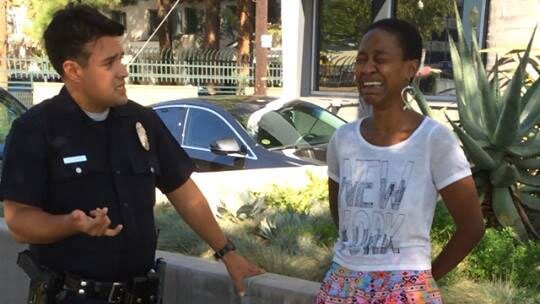The Benefit of the Doubt: On Why Kissing Is the Latest Thing That Black People Can’t Do


photo via Daniele Watts’ Facebook
In Los Angeles last week, actress Danièle Watts was handcuffed and detained by two police officers before eventually being released without having charges pressed against her. According to a post Watts wrote on Facebook, she and her partner were approached by the Studio City policemen, after which she was handcuffed because she “refus[ed] to agree that [she] had done something wrong by showing affection, fully clothed, in a public place.” The LAPD released a statement saying: “they were responding to a complaint that a man and woman were involved in indecent exposure in a silver Mercedes with the door open.” Watts’s partner, vegan chef Brian James Lucas (who is white), showed the officers ID (which is not required under California law) and was not handcuffed or detained, but Watts (who is black), refused to show ID (her right under California law), and was not so fortunate. Watts, who was talking on the phone with her father when the cops approached her, was reduced to tears as she was cuffed and led to the back of a police car, before eventually being let go because the police had absolutely nothing for which to arrest Watts or Lucas.
And so it goes in America. The Los Angeles Times reports that the handcuffing of Watts happened less than a month “after Beverly Hills police officers handcuffed and detained Charles Belk, an African American film producer who was visiting the city to attend a pre-Emmy party. Police officials later expressed regret, calling the incident ‘extremely unfortunate.'” It’s been just over a month since the death of Michael Brown, who was executed in the street without having been charged with any crime. One month before that, Staten Island grandfather Eric Garner was choked to death on the sidewalk, and was posthumously subjected to headlines wondering whether he was a “citizen or skell.” And these are but a few examples of the countless times that people of color in America are not given the same kind of due process, the same sort of benefit of the doubt that so many other Americans have been granted from birth. None of this is new, of course. All of it is, in fact, as old as racism itself, as old as the perpetuation of a societal imbalance of power in order to maintain the existing hierarchical structure—all of which is to say, this kind of racism is as old as sand, and just as insidious and ineradicable once it enters a system.
It’s enough to make you want to close your eyes to superficially minor situations like these, to acknowledge that they exist but also comfort yourself with the fact that most incidents like these don’t end in death, just, you know, with the ongoing terrorization of a huge group of people in the country, who aren’t being given the benefit of the doubt when it comes to things like whether or not they can kiss their husbands in a public place. But the documentation of these types of incidents is just as essential as continued coverage of the aftermath of Brown’s and Garner’s murders precisely because of the relatively minor nature of what transpired. It is this type of structurally enforced undermining of a whole race of people (the assumption that—because Watts is black and Lucas is white—their relationship was not one between a husband and wife, but rather a prostitute and client, is disgusting) which perpetuates the ongoing “blame the victim” situation that happens every time a black man or woman is treated unfairly by the police. Whether it’s Garner being called out on the misdemeanors in his past or New York commenters faulting Watts for failing to comply with the officers who were harassing her as she stood on the phone talking with her father, there always seem to be new ways for black victims to be asked to shoulder the blame for their own oppression.
The detainment of Watts isn’t some sort of revival of the anti-miscegenation laws that used to be on the books in many states across the country until they were federally banned in 1967, rather it is an indicator of how intractable certain biases remain in America, even in 2014. Just as black men are not given the benefit of the doubt when it comes to being law-abiding citizens, and are instead assumed to be engaged in criminal activity unless proven otherwise, black women—a group which has been historically sexually oppressed and abused in this country—are never given the benefit of the doubt that white women would have in situations like this. A recent profile of Bill Cosby in The New Yorker reinvokes Cosby’s infamous “pound cake” quote, in which he blames victims of police brutality for incurring the wrath solely through their own actions:
“These are people going around stealing Coca-Cola. People getting shot in the back of the head over a piece of pound cake! And then we all run out and are outraged: ‘The cops shouldn’t have shot him.’ What the hell was he doing with the pound cake in his hand? I wanted a piece of pound cake just as bad as anybody else. And I looked at it and I had no money. And something called parenting said, ‘If you get caught with it you’re going to embarrass your mother.'”
The philosophy that all black men and women need to do to stay safe is just to never do a single thing wrong in their entire lives—or even anything that can be interpreted as being wrong—takes away their agency and humanity in as real a way as did that cop who handcuffed Watts for refusing to show her ID and submit to questioning for the simple act of embracing her husband. To err, lest we forget, is just about the most human thing there is, and by drawing some line in the sand about who is allowed to make those errors and who is not—at the risk of getting shot, no less—is as surreal and unsustainable a dictate imaginable. The benefit of the doubt simply doesn’t exist for all people, and until it does, until a black woman can embrace her white husband without being accused of prostitution, it is pointless and harmful to assert that there are simple ways for black people to avoid police harassment. When a kiss counts as a crime, we only have continued proof that the only thing about black people’s actions that police continue to doubt, is their innocence.
Follow Kristin Iversen on twitter @kmiversen
You might also like 




















